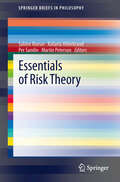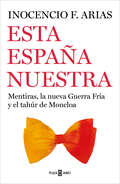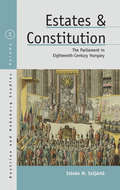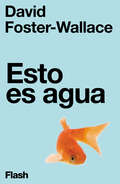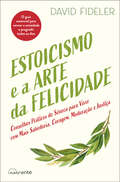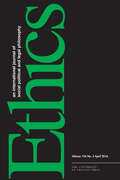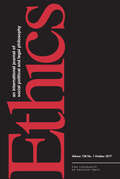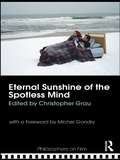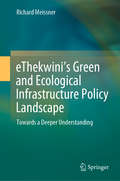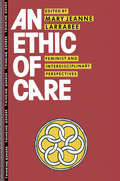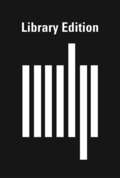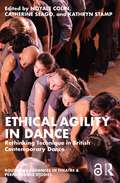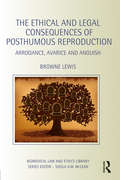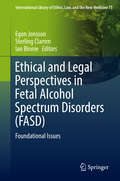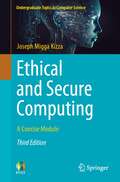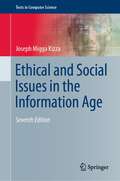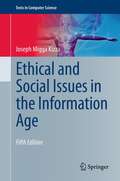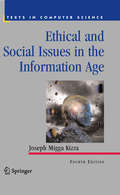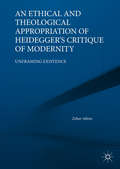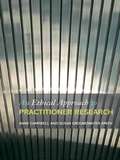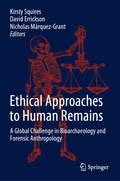- Table View
- List View
Essentials of Risk Theory
by Per Sandin Rafaela Hillerbrand Sabine Roeser Martin PetersonRisk has become one of the main topics in fields as diverse as engineering, medicine and economics, and it is also studied by social scientists, psychologists and legal scholars. This Springer Essentials version offers an overview of the in-depth handbook and highlights some of the main points covered in the Handbook of Risk Theory. The topic of risk also leads to more fundamental questions such as: What is risk? What can decision theory contribute to the analysis of risk? What does the human perception of risk mean for society? How should we judge whether a risk is morally acceptable or not? Over the last couple of decades questions like these have attracted interest from philosophers and other scholars into risk theory. This brief offers the essentials of the handbook provides for an overview into key topics in a major new field of research and addresses a wide range of topics, ranging from decision theory, risk perception to ethics and social implications of risk. It aims to promote communication and information among all those who are interested in theoretical issues concerning risk and uncertainty. The Essentials of Risk Theory brings together internationally leading philosophers and scholars from other disciplines who work on risk theory. The contributions are accessibly written and highly relevant to issues that are studied by risk scholars. The Essentials of Risk Theory will be a helpful starting point for all risk scholars who are interested in broadening and deepening their current perspectives.
Esta España nuestra: Mentiras, la nueva Guerra Fría y el tahúr de Moncloa
by Inocencio F. AriasTras el éxito de su último libro, Con pajarita y sin tapujos, el diplomático de la mirada inteligente y la pluma afilada, vuelve para hacer un certero, ingenioso y, en ocasiones, socarrón repaso al mundo contemporáneo post-COVID 19. Cuando «el inquilino de Moncloa» pregonó durante los peores momentos de la pandemia que tras esta «saldríamos mejores», no quiso ver la obviedad de lo que se avecinaba y probablemente minimizó a sabiendas el contraataque independentista de Cataluña tras el fracaso del procés, las luchas de poder con sus socios de gobierno encabezados por Pablo Iglesias, el menguante papel de España en el extranjero o el desastre económico actual que ha subido los niveles de corrupción y, sobre todo, de desempleo a límites estratosféricos. Que no cunda el pánico: Inocencio F. Arias vuelve para recordarnos, con lucidez e ironía, que Esta España nuestra está lejos de ser el país de luz y color que nos han vendido. La mentira es ya una seña de identidad. Pero no se queda ahí: además reflexiona, con su humor característico y sin tomar rehenes, sobre la unidad de España, la memoria histórica, los retos a los que se enfrenta la Monarquía, el auge y la posterior pérdida de credibilidad de Biden, la Ley del Embudo de Podemos, las consecuencias de encolerizar torpemente a Marruecos, la debilitada posición de la Iglesia en España o la responsabilidad del gobierno en nuestra cuarteada imagen en el exterior, entre otros muchos temas. Y hasta se atreve con un fascinante relato de política-ficción sobre qué hubiera sucedido si la República hubiera ganado la Guerra Civil.
Estado Vegetal: Performance and Plant-Thinking (Art After Nature)
by Giovanni AloiInterdisciplinary essays on Manuela Infante&’s award-winning play explore the relationship between critical plant studies and performance art in the Anthropocene Since its first staging in 2016, Estado Vegetal, Manuela Infante&’s riveting piece of experimental performance art, has expanded philosophical thinking into a fully-fledged artistic inquiry of nonanthropocentric being. Through Infante&’s polyvocal monologue, acted with impetus by Marcela Salinas, plants are charged with an agency capable of uprooting culturally grounded conceptions of the world in the face of incommensurable trauma and loss. This first book dedicated to Infante&’s plant-focused performance features eight essays by scholars, poets, and artists whose practices draw from research fields as disparate as new materialism, anthropogenic feminism, queer studies, and speculative realism. Including an interview with Infante, the full playscript, and stills from the performance, Estado Vegetal: Performance and Plant-Thinking reveals the roles that plants in art can play in productively reconfiguring human–nonhuman relations within current anthropogenic perspectives. Infante&’s performance is a perfect case study and reference point for anyone interested in exploring the complexities of plant-thinking through alternative and experimental avenues. Furthermore, this book is at once a critical plant studies primer and an artistic problematization of the philosophical questions that have been central to the latest multidisciplinary discussions on plant-being. Contributors: Maaike Bleeker, Utrecht U; Lucy Cotter, Portland State U; Prudence Gibson, UNSW Sydney; Michael Marder, U of the Basque Country; Dawn Sanders, U of Gothenburg; Catriona Sandilands, York U; Sibila Sotomayor Van Rysseghem, colectivo LASTESIS; Mandy-Suzanne Wong.
Estates and Constitution: The Parliament in Eighteenth-Century Hungary (Austrian and Habsburg Studies #30)
by István M. SzijártóAcross eighteenth-century Europe, political power resided overwhelmingly with absolute monarchs, with notable exceptions including the much-studied British Parliament as well as the frequently overlooked Hungarian Diet, which placed serious constraints on royal power and broadened opportunities for political participation. Estates and Constitution provides a rich account of Hungarian politics during this period, restoring the Diet to its rightful place as one of the era’s major innovations in government. István M. Szijártó traces the religious, economic, and partisan forces that shaped the Diet, putting its historical significance in international perspective.
Esto es agua: Algunas ideas, expuestas en una ocasión especial, sobre cómo vivir con compasión (Flash Ensayo #Volumen)
by David Foster WallaceEscrito en 2005 y debatido ampliamente tras la muerte del autor, este discurso es un legado conciso de uno de los grandes pensadores de nuestro tiempo. Transido con su humor único, su intelecto preciso y su filosofía práctica, Esto es agua muestra los retos de la vida diaria y ofrece consejos que nos renuevan con cada lectura. Había una vez dos peces jóvenes que iban nadando y se encontraron por casualidad con un pez mayor que nadaba en dirección contraria; el pez mayor les saludó con la cabeza y les dijo: «Buenos días, chicos. ¿Cómo está el agua?» A los seis años de la muerte de David Foster Wallace publicamos Esto es agua, la legendaria conferencia que impartió en la ceremonia de graduación de la Universidad de Kenyon, ante un auditorio plagado de alumnos embelesados. Escrito en 2005 y ampliamente debatido tras su muerte, este discurso es el conciso legado de uno de los más grandes autores de nuestro tiempo, que se quitó la vida en el momento álgido de su fama y con tan solo cuarenta y seis años. Reseña:«Era mi favorito.»Zadie Smith
Esto es agua
by David Foster Wallace¿Cómo evitamos vivir nuestras vidas estando muertos, siendo inconscientes, meros esclavos de nuestras cabezas y sintiéndonos completa e imperialmente solos, día tras día? ¿Cómo logramos distanciarnos de nuestros pensamientos egocéntricos y logramos ser lo bastante conscientes y estar lo bastante despiertos como para elegir a qué prestar atención y cómo construir el sentido a partir de la experiencia? A medida que busca respuestas a estas preguntas nada sencillas, David Foster Wallace hace agudas observaciones acerca de la vida contemporánea y pone de manifiesto los fundamentos de la naturaleza humana. Y al hacerlo, revela una de las decisiones más importantes e inconscientes que tomamos todos los días: qué pensamos sobre el mundo que nos rodea.Transido con el humor único de David Foster Wallace, su intelecto preciso y su filosofía práctica, Esto es agua muestra los retos de la vida diaria y ofrece consejos que nos renuevan con cada lectura.«Era mi favorito.»Zadie Smith
Estoicismo e a Arte da Felicidade
by David FidelerOs estoicos preocupavam-se intensamente com a pergunta: o que é necessário para viver a melhor vida possível? Se os humanos conseguissem responder a essa pergunta, acreditavam eles, poderiam viver vidas felizes e tranquilas — ainda que o mundo parecesse louco e descontrolado. Isto fez do estoicismo uma filosofia muito prática e também explica o seu reaparecimento atual, pois o nosso tempo — social, político, económico e ambiental — também parece louco e descontrolado.» O estoicismo, a mais influente filosofia do Império Romano, oferece novas formas para desenvolvermos o nosso caráter perante o mundo imprevisível em que vivemos. Amplamente reconhecido como o mais talentoso escritor estoico, Séneca ensina-nos a viver uma vida autêntica e com propósito, a ultrapassar a dor e a transformar a adversidade em oportunidades de crescimento. Esta obra explora as ideias principais do pensamento estoico, demonstrando porque são hoje mais atuais do que nunca. Oito ensinamentos fundamentais - «Viver de acordo com a natureza» para encontrar a felicidade. - A excelência do caráter interior de cada um é o único bem verdadeiro. - Algumas coisas estão inteiramente sob o nosso controlo, enquanto outras não. - Embora não possamos controlar o que nos acontece, podemos controlar a nossa crítica interna e a forma como respondemos aos eventos da vida. - Quando algo negativo sucede, não devemos surpreender-nos, mas ver isso como uma oportunidade para criar uma situação melhor. - A virtude é em si a própria recompensa. É um estado de tranquilidade mental e alegria interior. - A verdadeira filosofia envolve «progredir». - É essencial que nós, enquanto indivíduos, contribuamos para a sociedade. «Este livro é uma joia rara: simultaneamente reconfortante e desafiador, instrutivo e divertido.» Eric Weiner autor bestseller de A Geografia da Felicidade
ET vol 126 num 3
by The University of Chicago PressThis is volume 126 issue 3 of Ethics. Ethics features scholarly work that covers a range of topics pertaining to moral, political, and legal philosophy from a variety of intellectual perspectives, including social and political theory, law, and economics. Articles in the journal present new theories, apply theory to contemporary moral issues, and focus on historical works that have significant implications for contemporary theory. In addition to major articles, Ethics publishes critical discussions, symposia, review essays, and book reviews.
ET vol 128 num 1
by The University of Chicago PressThis is volume 128 issue 1 of Ethics. Ethics features scholarly work that covers a range of topics pertaining to moral, political, and legal philosophy from a variety of intellectual perspectives, including social and political theory, law, and economics. Articles in the journal present new theories, apply theory to contemporary moral issues, and focus on historical works that have significant implications for contemporary theory. In addition to major articles, Ethics publishes critical discussions, symposia, review essays, and book reviews.
Eternal Sunshine of the Spotless Mind (Philosophers on Film)
by Christopher GrauEternal Sunshine of the Spotless Mind is one of the most widely discussed and thought-provoking films of recent years. This is the first book to explore and address the philosophical aspects of Eternal Sunshine of the Spotless Mind. Beginning with a helpful introduction that places each essay in context, specially commissioned chapters examine the following topics: philosophical issues surrounding love, friendship, affirmation and repetition the role of memory (and the emotions) in personal identity and decision-making the morality of imagination and ethical importance of memory philosophical questions about self-knowledge and knowing the minds of others the aesthetics of the film considered in relation to Gondry’s other works and issues in the philosophy of perception Including a foreword by Michel Gondry and a list of further reading, this volume is essential reading for students interested in philosophy and film studies.
eThekwini’s Green and Ecological Infrastructure Policy Landscape: Towards a Deeper Understanding
by Richard MeissnerThis book offers the reader a deeper understanding of the eThekwini Metropolitan Municipality’s green and ecological infrastructure policy landscape. The author utilises the PULSE3 analytical framework to conduct an in-depth examination and to show how experts frame and implement the municipality’s green and ecological infrastructure strategies and projects. Although the initial purpose of this book was to investigate the role of green and ecological infrastructures in eThekwini’s water security aspirations, the author realised that climate change adaptation and mitigation play a more central role in motivating the municipality to develop and implement such science-driven projects. To be sure, science that is informed by a positivist paradigm, guides how, where and when the municipality should develop green and ecological infrastructures. Furthermore, a positivistic stance is generated in this policy landscape, where science and politics meet at a local government level, and the book offers an insight into the science–policy interface, as well as the normative and value orientations that positivism often ignores. The book also shows the usefulness of the PULSE3 framework and how it can assist scientists in all fields to gain a deeper understanding of the complications that are faced by humankind. This book fills a market gap by providing a view of how scientists think about problems and how to solve them by using established paradigms and theories.
An Ethic of Care: Feminist and Interdisciplinary Perspectives (Thinking Gender)
by Mary Jeanne LarrabeePublished in 1982, Carol Gilligan's In a Different Voice proposed a new model of moral reasoning based on care, arguing that it better described the moral life of women. An Ethic of Care is the first volume to bring together key contributions to the extensive debate engaging Gilligan's work. It provides the highlights of the often impassioned discussion of the ethic of care, drawing on the literature of the wide range of disciplines that have entered into the debate. Contributors: Annette Baier, Diana Baumrind, Lawrence A. Blum, Mary Brabeck, John Broughton, Owen Flanagan, Marilyn Friedman, Carol Gilligan, Catherine G. Greeno, Catherine Jackson, Linda K. Kerber, Mary Jeanne Larrabee, Zella Luria, Eleanor E. Maccoby, Linda Nicholson, Bill Puka, Carol B. Stack, Joan C. Tronto, Lawrence Walker, Gertrud Nunner-Winkler.
Ethical Adaptation to Climate Change: Human Virtues of the Future
by Allen Thompson Jeremy Bendik-KeymerAn analytically precise and theoretically probing exploration of the challenge to our values and virtues posed by climate change.Predictions about global climate change have produced both stark scenarios of environmental catastrophe and purportedly pragmatic ideas about adaptation. This book takes a different perspective, exploring the idea that the challenge of adapting to global climate change is fundamentally an ethical one, that it is not simply a matter of adapting our infrastructures and economies to mitigate damage but rather of adapting ourselves to realities of a new global climate. The challenge is to restore our conception of humanity—to understand human flourishing in new ways—in an age in which humanity shapes the basic conditions of the global environment. In the face of what we have unintentionally done to Earth's ecology, who shall we become?The contributors examine ways that new realities will require us to revisit and adjust the practice of ecological restoration; the place of ecology in our conception of justice; the form and substance of traditional virtues and vices; and the organizations, scale, and underlying metaphors of important institutions. Topics discussed include historical fidelity in ecological restoration; the application of capability theory to ecology; the questionable ethics of geoengineering; and the cognitive transformation required if we are to “think like a planet.”
Ethical Agility in Dance: Rethinking Technique in British Contemporary Dance (Routledge Advances in Theatre & Performance Studies)
by Noyale Colin Catherine Seago Kathryn StampThis edited collection examines the potential of dance training for developing socially engaged individuals capable of forging ethical human relations for an ever-changing world and in turn frames dance as a fundamental part of human experience. This volume draws together a range of critical voices to reflect the inclusive potential of dance. The contributions offer perspectives on contemporary dance training in Britain from dance educators, scholars, practitioners and artists. Through examining the politics, values and ethics of learning dance today, this book argues for the need of a re-assessment of the evolving practices in dance training and techniques. Key questions address how the concept of ‘technique’ and associated systems of training in dance could be redefined to enable the collaboration of skills and application of ideas necessary to twenty-first-century dance. The editors present these ideas in different modes of writing. This collection of essays, conversations and manifestos offers a way to explore, debate and grasp the shifting values of contemporary dance. Examining these values in the applied field of dance reveals a complex and contrasting range of ideas, encompassing broad themes including the relationships between individuality and collectivity, rigour and creativity, and virtuosity and inclusivity. This volume points to ethical techniques as providing a way of navigating these contrasting values in dance. It serves as an invaluable resource for academics as well as practitioners and students.
Ethical and Legal Aspects of Computing: A Professional Perspective from Software Engineering (Undergraduate Topics in Computer Science)
by Gerard O'ReganThis textbook presents an overview of the critically important ethical and legal issues that arise in the computing field and provides a professional perspective from software engineering. The author gained exposure to these aspects of computing while working as a software engineer at Motorola in Ireland, where he coordinated the patent programme and worked with several software suppliers. Topics and features: Presents a broad overview of ethics and the lawIncludes key learning topics, summaries, and review questions in each chapter, together with a useful glossaryDiscusses the professional responsibility of computer professionalsExplores ethics in various civilisations and religious traditionsDiscusses ethical software engineering and ethical outsourcingConsiders what is fair and ethical in data scienceDescribes ethical challenges that arise in social media and the AI fieldReviews intellectual property including patents, copyright and trademarks This practical and easy-to-follow textbook/reference is ideal for computer science students seeking to understand legal and ethical aspects of computing. The text also serves as a concise self-study primer for software engineers and software managers.
The Ethical and Legal Consequences of Posthumous Reproduction: Arrogance, Avarice and Anguish (Biomedical Law and Ethics Library)
by Browne LewisPosthumous reproduction refers to the procedure that enables a child to be conceived using the gametes of a dead person. Advances in reproductive technology mean it is now possible to assist in creating a life after you die, and in recent years the number of women who have attempted to get pregnant using posthumous reproduction has increased. However, the law in many jurisdictions has not put regulations in place to deal with the ethical and legal consequences that arise as a result of posthumous reproduction. This is the first book to exclusively focus on posthumous reproduction. The book comprehensively explores the legal and ethical issues surrounding posthumous reproduction in a number of jurisdictions including the US, Israel, the UK and France. The book looks at a number of issues including: ascertaining the wishes of the dead and protecting the reproductive rights of men who have deposited frozen sperm in clinics prior to their deaths; cases involving people who want to acquire fresh sperm from deceased or incompetent men and determining who should have the right to accept the sperm; identifying the parents of the posthumously conceived child; and discussing the need to promote the best interests of the child. The book critically examines the current laws that are in place and proposes additional regulations and policies in order to effectively regulate posthumous reproduction.
Ethical and Legal Perspectives in Fetal Alcohol Spectrum Disorders (FASD)
by Egon Jonsson Sterling Clarren Ian BinnieThis book discusses how to deal ethically with people with Fetal Alcohol Spectrum Disorder (FASD) in the police, courts and correctional services. Ethical and legal issues associated with the deficits of individuals with a brain disorders such as FASD are surfacing more and more frequently in criminal proceedings. People with FASD often have not been diagnosed and rarely exhibit any visible evidence of the disorder. It has been argued that this invisible disability puts them in a disadvantaged position in the justice system, since the awareness of this condition is limited. The need to identify and to address FASD more effectively and the many ethical issues this raises within the context of the law is increasingly acknowledged within judicial and legislative branches, as well as in government departments, agencies and community programs that provide services to those with FASD and their caretakers and families. This is the first book to give to elaborate on ethical and legal issues of FASD.
Ethical and Secure Computing: A Concise Module (Undergraduate Topics in Computer Science)
by Joseph Migga KizzaThis textbook highlights the essential need for a strong ethical framework in our approach to teaching of and working in computer, information and engineering sciences.Through thought-provoking questions and case studies, the reader is challenged to consider the deeper implications arising from the use of today’s rapidly evolving computing technologies and ever-changing communication ecosystems.This thoroughly revised and updated third edition features revised chapters with new and updated content and hardened the ethical framework. To cope with the rapidly changing computing and telecommunication ecosystem, a new chapter, Ethics and Social Responsibility in the Metaverse, has been added. The interface between our current universe and the evolving metaverse presents a security quagmire. The discussion throughout the book is candid and intended to ignite students’ and professionals’ interest and active participation in discussions of the issues we are facing now and those likely to emerge in the near future. Topics and features—including fully updated content:Introduces a philosophical framework and tools for understanding and analyzing computer ethics in personal, public, and professional spheresDescribes the impact of computer technology on issues of security, privacy, anonymity, and civil libertiesDiscusses the security and ethical quagmire in the platforms of the developing metaverse (NEW chapter)Examines intellectual property rights in the context of computing, including the risks and liabilities associated with softwareDiscusses such key social issues in computing as the digital divide, employee monitoring in the workplace, and risks to physical and mental healthReviews the history of computer crime, and the threat of digitally facilitated bullying, harassment, and discriminationConsiders the ethical challenges arising from online social networks, mobile telecommunication technologies, virtual reality, the Internet of Things and 5G technologiesIncludes learning objectives, discussion questions and exercises throughoutThis concise and accessible work addresses the critical ethical and moral issues important to all designers and users of computer technologies. The text incorporates the latest curricula requirements for undergraduate courses in computer science, as well as offers invaluable insights into the social impact and legal challenges posed by the latest generation of computing devices and networks.
Ethical and Social Issues in the Information Age (Texts in Computer Science)
by Joseph Migga KizzaThis textbook examines the ethical, social, and policy challenges arising from our rapidly and continuously evolving computing technology—ranging from the Internet, over to the cross-platforms consisting of ubiquitous portable and wearable devices to the eagerly anticipated metaverse—and how we can responsibly access and use these spaces. The text emphasizes the need for a strong ethical framework for all applications of computer science and engineering in our professional and personal life.This comprehensive seventh edition features thoroughly revised chapters with new and updated content, hardened by the bedrock ethical and moral values. Because of the rapidly changing computing and telecommunication ecosystem, a new chapter on Ethics and Social Responsibility in the Metaverse has been added. The interface between our current universe and the evolving metaverse presents a security quagmire. The discussion throughout the book is candid and intended to ignite students' interest and participation in class discussions and beyond. Topics and features:Establishes a philosophical framework and analytical tools for discussing moral theories and problems in ethical relativismOffers pertinent discussions on privacy, surveillance, employee monitoring, biometrics, civil liberties, harassment, the digital divide, and discriminationDiscusses the security and ethical quagmire in the platforms of the developing metaverseProvides exercises, objectives, and issues for discussion with every chapterExamines the ethical, cultural and economic realities of mobile telecommunications, computer social network ecosystems, and virtualization technologyReviews issues of property rights, responsibility and accountability relating to information technology and softwareExplores the evolution of electronic crime, network security, and computer forensicsIntroduces the new frontiers of ethics: virtual reality, artificial intelligence, and the InternetThis extensive textbook/reference addresses the latest curricula requirements for understanding the cultural, social, legal, and ethical issues in computer science and related fields, and offers invaluable advice for industry professionals wishing to put such principles into practice.
Ethical and Social Issues in the Information Age (Texts in Computer Science)
by Joseph Migga KizzaThis new edition examines the ethical, social, and policy challenges stemming from computing and telecommunication technology, and mobile information-enabling devices. Features: establishes a philosophical framework and analytical tools for discussing moral theories and problems in ethical relativism; offers pertinent discussions on privacy, surveillance, employee monitoring, biometrics, civil liberties, harassment, the digital divide, and discrimination; examines the new ethical, cultural and economic realities of computer social networks; reviews issues of property rights, responsibility and accountability relating to IT and software; discusses how virtualization technology informs ethical behavior; introduces the frontiers of ethics in VR, AI, and the Internet; surveys the social, moral and ethical value systems in mobile telecommunications; explores the evolution of electronic crime, network security, and computer forensics; provides exercises, objectives, and issues for discussion in every chapter.
Ethical and Social Issues in the Information Age, 4th Edition
by Joseph Migga KizzaThe frequency of new editions of this book is indicative of the rapid and tremendous changes in the fields of computer and information sciences. First published in 1995, the book has rapidly gone through three editions already and now we are in the fourth. Over this period, we have become more dependent on computer and telecommunication technology than ever before and computer technology has become ubiquitous. Since I started writing on social computing, I have been advocating a time when we, as individuals and as nations, will become totally dependent on computing technology. That time is almost on us. Evidence of this is embodied in the rapid convergence of telecommunication, broadcasting, and computing devices; the miniaturization of these devices; and the ever increasing storage capacity , speed of computation, and ease of use. These qualities have been a big pulling force sucking in millions of new users every day, sometimes even those unwilling. Other appealing features of these devices are the increasing number of applications, apps, as they are increasingly becoming known, and being wireless and easily portable. Whether small or big, these new gizmos have become the centerpiece of an individual’s social and economic activities and the main access point for all information. Individuals aside, computing technology has also become the engine that drives the nations’ strategic and security infrastructures that control power grids, gas and oil storage facilities, transportation, and all forms of national communication, including emergency services.
Ethical and Social Issues in the Information Age, 5th Edition
by Joseph Migga KizzaThis new edition examines the ethical, social, and policy challenges stemming from computing and telecommunication technology, and mobile information-enabling devices. Features: establishes a philosophical framework and analytical tools for discussing moral theories and problems in ethical relativism; offers pertinent discussions on privacy, surveillance, employee monitoring, biometrics, civil liberties, harassment, the digital divide, and discrimination; examines the new ethical, cultural and economic realities of computer social networks; reviews issues of property rights, responsibility and accountability relating to IT and software; discusses how virtualization technology informs ethical behavior; introduces the frontiers of ethics in VR, AI, and the Internet; surveys the social, moral and ethical value systems in mobile telecommunications; explores the evolution of electronic crime, network security, and computer forensics; provides exercises, objectives, and issues for discussion in every chapter.
An Ethical and Theological Appropriation of Heidegger’s Critique of Modernity: Unframing Existence
by Zohar AtkinsThis book is at once a deeply learned and original reading of Heidegger and a primary text in its own right. It demonstrates the relevance of Heidegger’s thought in responding to the moral and religious challenges of 21st century existence. It shows that Heidegger’s project can be defended against many criticisms once its existential character is taken seriously. What emerges is a powerful exercise in thinking, not about Heidegger, but with and against him. As such, Atkins engages Heidegger as a means of advancing a defense of spirituality in the modern world that holds spirituality itself accountable for its lapses into the mundane. Addressing the most influential figures in recent Continental philosophy, such as Emmanuel Levinas and Theodor W. Adorno, this is a work that will be of timely use to philosophers, theologians, artists, and seekers.
An Ethical Approach to Practitioner Research: Dealing with Issues and Dilemmas in Action Research
by Anne Campbell Susan Groundwater-SmithPractice based research is burgeoning in a number of professional areas. An Ethical Approach to Practitioner Research covers a comprehensive range of issues and dilemmas encountered in practitioner and action research contexts. While principally focused upon practitioner inquiry in education it takes account of, and acknowledges that others engaged in professional practice such as in legal, nursing and social care contexts, face similar issues and dilemmas. It aims to stimulate ethical thinking and practice in enquiry and research contexts. Following moves to promote professional learning and development in the workplace, there is an increase in the number of practitioners engaging in action or inquiry based learning in the workplace supported by university staff or consultants, as evidenced in the emergence of professional learning communities and learning networks. There are many tensions inherent in relationships between practitioners and academics in terms of the setting of the research agenda, the policy implications that may flow from it and the right to publish outcomes. Negotiating that relationship requires ethical probity where each party recognises, understands and respects mutual responsibilities. The book explores this through a wide variety of roles from those of academic researchers, consultants and teachers to professional practitioners as researchers and, importantly, students and children. It therefore illustrates a number of differing perspectives about ethics and research which are allied to those roles Drawing on the expertise of international researchers and academics from America, Australia and Europe, the book provides invaluable support to the novice researcher and illuminates some of the more intricate issues for the more experienced research practitioner.Packed with detailed and thought-provoking examples this book contains both theoretical analyses of ethical matters and offers practical advice to practitioner and action researchers across the fields of schools hospitals and community and family settings.
Ethical Approaches to Human Remains: A Global Challenge in Bioarchaeology and Forensic Anthropology
by Nicholas Márquez-Grant Kirsty Squires David ErricksonThis book is the first of its kind, combining international perspectives on the current ethical considerations and challenges facing bioarchaeologists in the recovery, analysis, curation, and display of human remains. It explores how museum curators, commercial practitioners, forensic anthropologists, and bioarchaeologists deal with ethical issues pertaining to human remains in traditional and digital settings around the world. The book not only raises key ethical questions concerning the study, display, and curation of skeletal remains that bioarchaeologists must face and overcome in different countries, but also explores how this global community can work together to increase awareness of similar and, indeed, disparate ethical considerations around the world and how they can be addressed in working practices. The key aspects addressed include ethics in bioarchaeology and forensic anthropology, the excavation, curation, and display of human remains, repatriation, and new imaging techniques. As such, the book offers an ideal guide for students and practitioners in the fields of bioarchaeology, osteoarchaeology, forensic anthropology, medical anthropology, archaeology, anatomy, museum and archive studies, and philosophy, detailing how some ethical dilemmas have been addressed and which future dilemmas need to be considered.
